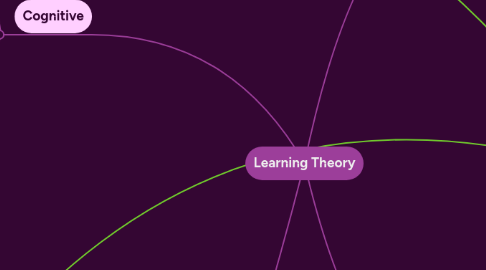
1. Cognitive
1.1. Information-Processing
1.1.1. Environmental Factors Affecting Students
1.1.1.1. Cognitive Load Theory
1.1.1.1.1. Teacher does not take into consideration the environment affecting her students cognitive load
1.1.1.2. Rote Learning
1.1.1.2.1. Practice
1.1.1.2.2. Transfer
1.1.1.2.3. Interference
1.1.1.2.4. Organisation
1.1.1.2.5. Serial Position
1.1.1.2.6. State Dependence
1.1.1.2.7. Level of Processing Effect
1.1.2. Internal Cognitive Development of Students
1.1.2.1. Solutions to Cognitive Development
1.1.2.1.1. Gagne Phases of Learning
1.1.2.1.2. Teacher Directed: Dual Coding Theory
1.1.2.1.3. Teacher Directed: Schema Theory
1.1.2.1.4. Teacher Directed: Bruner Learning Via Insight
1.1.2.1.5. Teacher Directed: Organisation Strategies
1.2. Motivation (Students)
1.2.1. Intrinsic
1.2.1.1. driven by an interest or enjoyment in the task itself
1.2.1.2. exists within the individual
1.2.1.3. high educational achievement and enjoyment by students.
1.2.1.4. Examples
1.2.1.4.1. Bandura's work on self-efficacy
1.2.1.4.2. Deci and Ryan's cognitive evaluation theory
1.2.1.4.3. self-determination theory
1.2.2. Extrinsic
1.2.2.1. comes from outside of the individual
1.2.2.1.1. Rewards
1.2.2.2. performed instrumentally to attain some separate consequence
1.2.2.2.1. would not occur spontaneously
1.2.2.2.2. must be prompted by incentives or other external pressures
2. New node
3. Social Constructivism
3.1. Collaborative Learning
3.1.1. Students are not engaged in collaboration learning in the classroom
3.1.2. Learning is Teacher-transmitted and directed
3.2. Learner-Centered Environment
3.2.1. Autonomy
3.2.1.1. Teacher expects students to follow her rules/ methods of learning
3.2.2. Interaction
3.2.2.1. Students are distracted in class
3.2.2.2. Lack of Teacher-Student interaction at the intellectual level
3.2.3. Exploration
3.2.3.1. No constructivist style questioning
3.2.3.2. Teacher does not challenge them to think critically or rationalize knowledge given to them
3.3. Learning through observation (Bandura)
3.3.1. Teacher and students have lack of respect for each other based on their prior experiences and knowledge of each other
3.3.2. Students do not have any reasons to motivate themselves as they don't find any value in doing so
4. Behaviourist
4.1. Motivation (Students)
4.1.1. Extrinsic
4.1.1.1. Reinforcement & Extinction
4.1.2. Intrinsic
4.1.2.1. Operant Conditioning
4.1.2.1.1. New node
4.2. Social Relationships
4.2.1. Self-Efficacy (Stipek)
4.2.1.1. Low
4.2.1.1.1. Preferential treatment to students
4.2.1.1.2. Feels ill-equipped in skills and does not perform well
4.2.1.1.3. Unwilling to try out new teaching methods
4.2.1.2. High
4.2.1.2.1. Ensure every student is involved in the lesson
4.2.1.2.2. Willing to try out new teaching methods
4.2.1.3. Results in self-fulfilling prophecy
4.2.1.3.1. Students behave in a manner that the teacher expects them to behave
4.2.2. Solution: Develop good rapport with the students
4.3. Individual Differences
4.3.1. Gender & Ethnic
